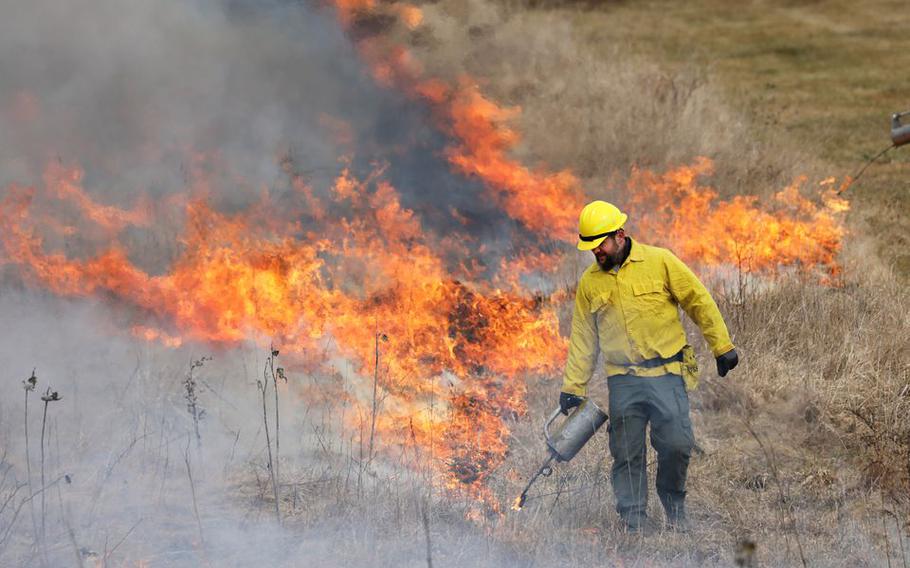
A park ranger lights grass on fire as the New Jersey Forest Fire Service does a prescribed burn at Natirar Park in Peapack-Gladstone, N.J., on Feb. 7, 2023. (Ed Murray, nj.com/TNS)
(Tribune News Service) — The New Jersey Department of Environmental Protection will use a nearly $1 million grant from the U.S. Department of Defense to reduce the risk of wildfires in forests surrounding four of the state’s military bases and training facilities, officials announced last week.
The grant was awarded after a surge in wildfires near Joint Base McGuire-Dix-Lakehurst in Burlington County and Warren Grove Range, a heavily-used National Guard training site in Ocean County.
The $995,000 grant will be used to reduce the fire risk near: Joint Base McGuire-Dix-Lakehurst; Warren Grove Range; Naval Weapons Station Earle, a U.S. Navy base in Monmouth County; and the Sea Girt National Guard Training Facility, also in Monmouth County.
New Jersey’s grant is one of 13 awards totaling $24 million handed out through the federal Readiness and Environmental Protection Integration Challenge Program this year, officials said.
The program’s mission is to improve climate change resilience and preserve land near military facilities, where wildfires could impact military operations and property.
Last year, the New Jersey Forest Fire Service responded to 1,175 wildfires that burned 12,664 acres, according to the state Department of Environmental Protection.
Due to dry weather conditions and a build-up of forest growth that could fuel fires, there have been a surge in forest fires adjacent to Joint Base McGuire-Dix-Lakehurst and the Warren Grove Range properties, REPI program officials found.
“Partnerships such as this help us ensure healthy forests that provide shade and shelter to visitors, keep open spaces green to sequester carbon, and also limit the greenhouse gas emissions that can increase ocean acidification,” state Commissioner of Environmental Protection Shawn M. LaTourette said in a statement.
The grant will fund New Jersey Forest Fire Service’s efforts to build firebreaks or “fuel breaks” and to thin forests, a proactive tactic to reduce the fire risk, according to the Department of Environmental Protection.
A firebreak — which is a gap in vegetation or other materials that acts as a barrier to divert or slow a wildfire from progressing — will be constructed in Bass River State Forest, which is adjacent to the Warren Grove Range.
The firebreak work, which is expected to begin in April, will include reducing flammable forest vegetation on a strip of land bordering Allen and Oswego roads in Bass River Township and Egg Harbor Township.
Clearing out combustible vegetation in Bass River State Forest will provide firefighters with better access to any fires in the area and help them better control the progress of potential wildfires, state officials said.
A similar tactic was used in Wharton State Forest, located in the Pine Barrens in South Jersey, and helped slow and limit the spread of the Mullica River Fire last year, state officials said. That was New Jersey’s largest wildfire in over 15 years.
Forest thinning will also be used on 1,305 acres in the Pine Barrens to promote healthier trees in the area, state officials said.
The funds will also help pay for the ongoing Greenwood Triangle Forest Fuels Maintenance Project, a firebreak and underbrush removal project in Brendan T. Byrne State Forest in the Pine Barrens, according to the plan.
Wildfire season, which has historically been between March and May in New Jersey, is lasting longer and becoming more unpredictable, according to state officials.
“Warmer springs and hotter, drier summers may lengthen New Jersey’s wildfire season and increase the occurrence of large fires,” Nick Angarone, the state’s Chief Climate Resilience Officer said in a statement.
“Reducing wildfire risk is a key aspect of ensuring that our farms, forests, and communities that are vital to our state’s economy and identity are resilient to a changing climate,” he said.
In addition to New Jersey, this year’s Readiness and Environmental Protection Integration Challenge Program grants were awarded to similar projects in Guam, Hawaii, Arizona, Texas, California, Washington and Virginia, federal officials said.
©2023 Advance Local Media LLC.
Visit nj.com.
Distributed by Tribune Content Agency, LLC.